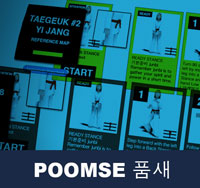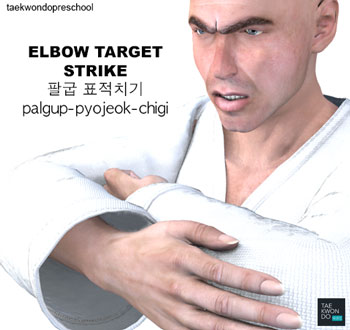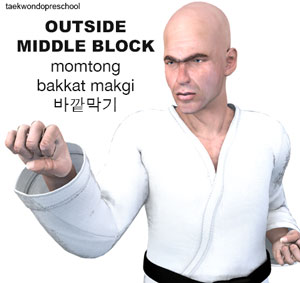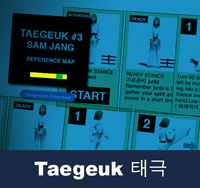Taekwondo 태권도Taekwondo Preschool
Promotion from one geup to the next can proceed rapidly in some schools, since schools often allow geup promotions every two, three, or four months. Students of geup rank learn the most basic techniques first, and then move on to more advanced techniques as they approach first dan. Many of the older and more traditional schools often take longer to allow students to test for higher ranks than newer, more contemporary schools, as they may not have the required testing intervals. View Taekwondo belt levels »

About Mushin
Mushin is achieved when a person's mind is free from thoughts of anger, fear, or ego during combat or everyday life.
Mushin (無心; Japanese mushin; English translation "no mind") is a mental state into which very highly trained martial artists are said to enter during combat. They also practice this mental state during everyday activities. The term is shortened from mushin no shin (無心の心), a Zen expression meaning the mind without mind and is also referred to as the state of "no-mindness". That is, a mind not fixed or occupied by thought or emotion and thus open to everything.
Mushin is achieved when a person's mind is free from thoughts of anger, fear, or ego during combat or everyday life. There is an absence of discursive thought and judgment, so the person is totally free to act and react towards an opponent without hesitation and without disturbance from such thoughts. At this point, a person relies not on what they think should be the next move, but what is their trained natural reaction or what is felt intuitively. It is not a state of relaxed, near-sleepfulness, however. The mind could be said to be working at a very high speed, but with no intention, plan or direction.
Some masters believe that mushin is the state where a person finally understands the uselessness of techniques and becomes truly free to move. In fact, that person will no longer even consider themselves as "fighters" but merely living beings moving through space.
The legendary Zen master Takuan Sōhō said:
"The mind must always be in the state of 'flowing,' for when it stops anywhere that means the flow is interrupted and it is this interruption that is injurious to the well-being of the mind. In the case of the swordsman, it means death. When the swordsman stands against his opponent, he is not to think of the opponent, nor of himself, nor of his enemy's sword movements. He just stands there with his sword which, forgetful of all technique, is ready only to follow the dictates of the subconscious. The man has effaced himself as the wielder of the sword. When he strikes, it is not the man but the sword in the hand of the man's subconscious that strikes."
However, mushin is not just a state of mind that can be achieved during combat. Many martial artists train to achieve this state of mind during kata so that a flawless execution of moves is accomplished — that they may be achieved during combat or at any other time. Once mushin is attained through the practice or study of martial arts (although it can be accomplished through other arts or practices that refine the mind and body), the objective is to then attain this same level of complete awareness in other aspects of the practitioner's life.
General qualities that judges look for in any taekwondo practitioner include proper breathing technique and body control. The diaphragm must be engaged in deep breathing, shallow breathing concentrated in the upper abdomen results in raised shoulders and stressed muscles. The muscles of the body should be lightly relaxed in order to perform the pattern with fluidity, speed and grace. Muscles should only be tensed at the moment of imaginary impact in order to commute maximum power to any individual taekwondo technique. For more information View Key Points »
RESOURCES
This article uses material from the Wikipedia article "Mushin", which is released under the Creative Commons Attribution-Share-Alike License 3.0.




















